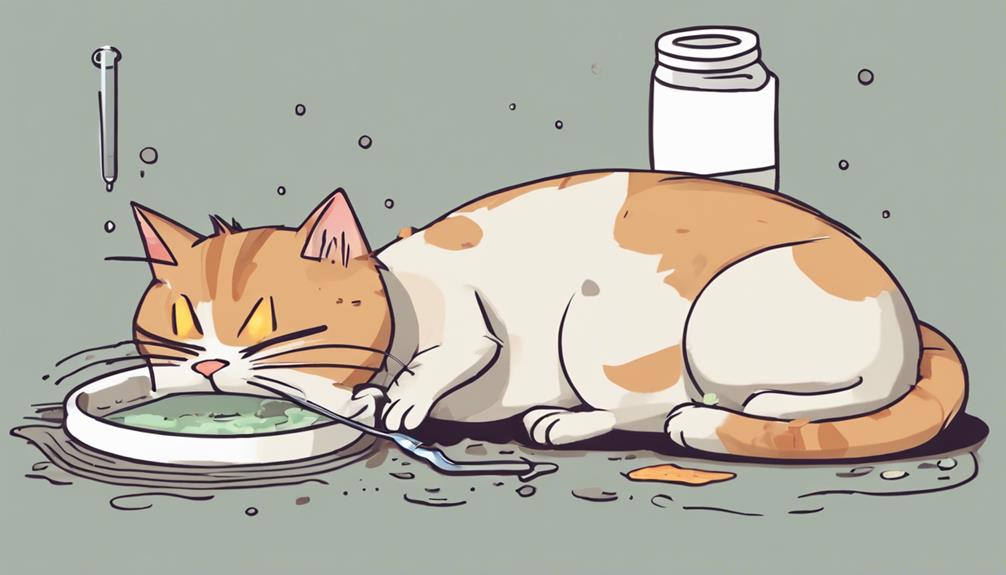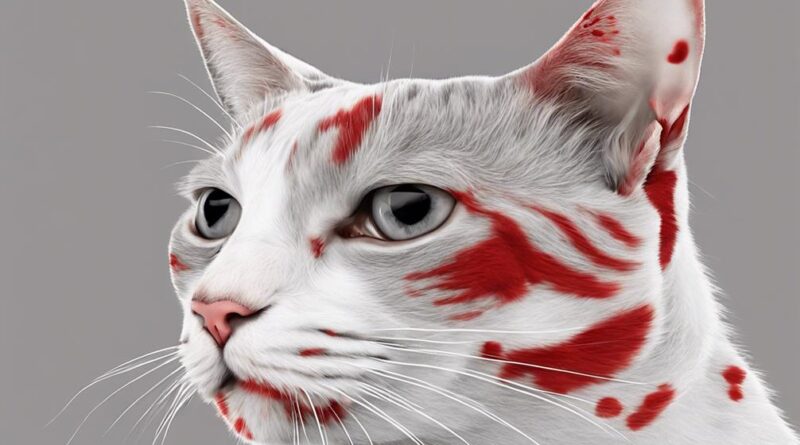Identifying Cat Vaccine Allergy: The Tell-Tale Signs
Did you know that cats can develop allergies to vaccines, just like humans?
If your feline friend starts exhibiting unusual symptoms after vaccination, it might be a sign of vaccine allergy.
Skin reactions, swelling, respiratory distress, and other symptoms can indicate an adverse reaction.
Recognizing these signs promptly is crucial for your cat's health and well-being.
Stay informed about the tell-tale signs to ensure your pet receives the necessary care in case of a vaccine allergy.
Signs of Cat Vaccine Allergy
If your cat is experiencing an allergic reaction to a vaccine, they may show specific signs indicating this adverse response. One common sign to watch out for is itching. Your cat may start scratching excessively, especially around the injection site. This itching can be bothersome for your feline friend and may lead to hair loss or skin irritation if not addressed promptly.
Another sign of a vaccine allergy in cats is sneezing. If you notice your cat sneezing more frequently after receiving a vaccine, it could be a red flag. Sneezing, along with nasal discharge or congestion, may indicate an allergic reaction that needs attention.
In some cases, a rash may develop on your cat's skin as a response to the vaccine. This rash can appear as red, inflamed areas that may be warm to the touch. If you see any unusual skin changes like rash or hives, it's essential to consult your veterinarian for further evaluation.
Skin Reactions
Skin reactions to cat vaccines may manifest as red, inflamed areas that can be warm to the touch. These reactions can vary in severity and may include symptoms such as an itchy rash or contact dermatitis. If your cat experiences a skin reaction after being vaccinated, you may notice redness and swelling at the injection site. The area may feel warm to the touch and could be accompanied by itchiness or discomfort.
Contact dermatitis, which is a type of skin irritation caused by direct contact with a substance, can also occur as a reaction to cat vaccines. This condition may present as red, itchy patches on your cat's skin, especially around the vaccination site. It's important to monitor your cat for any signs of skin reactions following vaccination, as these symptoms can indicate an allergic response to the vaccine.
If you observe any skin reactions in your cat after vaccination, it's essential to consult your veterinarian promptly. They can assess the severity of the reaction and provide appropriate treatment to alleviate your cat's discomfort. In some cases, your veterinarian may recommend antihistamines or other medications to help manage the allergic response and soothe your cat's skin.
Swelling or Hives
Swelling or hives may develop as a reaction to cat vaccines, causing raised bumps or welts on your cat's skin. This can be distressing for both you and your feline friend.
Here are some key points to help you understand this reaction better:
- Itching Sensation: Your cat may experience intense itching at the injection site or even in other areas of the body, making them uncomfortable and restless.
- Redness: The skin where the vaccine was administered might appear red and inflamed, indicating an allergic response to the vaccine.
- Allergic Reaction: Swelling or hives are often signs of an allergic reaction. If your cat has had allergic reactions to vaccines in the past, it's essential to inform your veterinarian before any future vaccinations.
If you notice swelling or hives on your cat after a vaccination, contact your veterinarian immediately. They can provide guidance on how to manage the reaction and whether any further treatment is necessary. It's crucial not to ignore these symptoms, as they can escalate into more severe issues if left untreated.
Respiratory Distress
Respiratory distress can manifest as a serious complication following a cat's vaccination, potentially indicating an adverse reaction that requires immediate attention. If your cat experiences breathing difficulties or wheezing episodes shortly after being vaccinated, it could be a sign of a vaccine allergy.
One of the key indicators of respiratory distress in cats post-vaccination is the onset of breathing difficulties. You may notice your cat struggling to breathe normally, such as rapid or shallow breathing, panting, or even open-mouth breathing. These signs shouldn't be taken lightly and require prompt veterinary evaluation.
Another common symptom to watch out for is wheezing episodes. Wheezing is characterized by a high-pitched whistling sound that occurs when your cat exhales, suggesting narrowed or inflamed airways. If your cat starts wheezing after vaccination, it could be a red flag for an allergic reaction.
In any case of respiratory distress following vaccination, it's crucial to seek immediate veterinary care. Your vet will be able to assess the severity of the reaction and provide necessary treatment to alleviate your cat's symptoms. Remember, early intervention is key to ensuring the well-being of your feline companion.
Digestive Issues
If your cat experiences digestive issues after being vaccinated, pay close attention to any changes in their eating habits or bowel movements. Some cats may have mild gastrointestinal upset following vaccinations, and it's essential to monitor them for any signs of discomfort.
Here are a few key points to consider:
- Dietary adjustments: In some cases, switching to a bland diet for a day or two can help alleviate digestive issues. Offer easily digestible foods like boiled chicken or plain rice to give your cat's stomach a break and see if their symptoms improve.
- Probiotic supplements: Introducing probiotics into your cat's diet can promote a healthy gut flora balance, potentially easing digestive discomfort. Consult your veterinarian to find a suitable probiotic supplement for your feline friend.
- Hydration: Ensure your cat is drinking enough water, especially if they're experiencing diarrhea or vomiting. Dehydration can worsen digestive issues, so encourage your cat to stay hydrated.
Lethargy
Feeling lethargic after vaccination isn't uncommon in cats, and it's essential to observe your feline friend closely for any signs of decreased energy levels. If your cat is experiencing vaccine-related fatigue or weakness, you may notice a significant decrease in their usual activity levels. They might seem less interested in playing, exploring, or interacting with you and other pets in the household. Your cat could appear sluggish, moving more slowly than usual, and may even prefer to rest in one spot for extended periods.
It's important to differentiate between normal post-vaccination tiredness and more severe lethargy that could signal an adverse reaction. While some cats bounce back quickly after vaccinations, others may take a bit longer to regain their energy. However, if your cat's fatigue persists for more than a day or two, or if it seems excessive compared to their usual behavior after vaccines, it's crucial to consult your veterinarian.
Keep an eye out for any accompanying symptoms that may indicate a more serious issue, such as fever or vomiting, which will be discussed in the next section. By monitoring your cat's energy levels closely and seeking prompt veterinary care if you notice concerning signs of weakness or fatigue, you can help ensure your feline companion's well-being after vaccination.
Fever and Vomiting

After observing your cat for signs of lethargy post-vaccination, the next important aspect to watch for is any indication of fever and vomiting that could point to a potential adverse reaction. If you notice these symptoms, it's crucial to act promptly to ensure your cat's well-being.
Signs to Watch For:
- Fever: Check if your cat feels warm to the touch or if they're unusually warm.
- Vomiting: Keep an eye out for frequent vomiting episodes or any signs of discomfort.
Fever and vomiting in cats post-vaccination can lead to dehydration risk. Dehydration is a serious concern and can worsen your cat's condition if not addressed promptly. To mitigate this risk, make sure your cat has access to fresh water at all times. If you suspect dehydration, contact your vet immediately for further guidance.
Treatment options for fever and vomiting in cats after vaccination may include supportive care at home, such as keeping your cat comfortable and monitoring their symptoms closely. However, if your cat's condition worsens or if you notice any concerning signs, such as lethargy or refusal to eat or drink, seek veterinary assistance without delay. Your vet can provide appropriate treatment options tailored to your cat's specific needs.
Anaphylaxis
Be vigilant for any sudden and severe allergic reactions in your cat following vaccination, as anaphylaxis can occur rapidly and pose a serious risk to your pet's health. Anaphylaxis is a severe, life-threatening allergic reaction that can manifest within minutes to hours after vaccination. Symptoms of anaphylaxis in cats may include difficulty breathing, collapse, weakness, vomiting, diarrhea, swelling of the face or limbs, and pale gums. If you suspect your cat is experiencing anaphylaxis, seek immediate veterinary care.
Risk factors for anaphylaxis in cats include a history of previous allergic reactions, known allergies to vaccine components, and certain breeds being more predisposed. To manage anaphylaxis, your veterinarian may administer medications such as epinephrine, antihistamines, and corticosteroids. Treatment options aim to stabilize your cat's condition, alleviate symptoms, and prevent further complications.
Prevention of anaphylaxis involves careful selection of vaccines based on your cat's medical history and risk factors. Your veterinarian may recommend pre-medication with antihistamines before vaccination in high-risk individuals. Always observe your cat closely following vaccination and report any concerning signs to your veterinarian promptly. By being informed and proactive, you can help safeguard your cat's health and well-being.
Frequently Asked Questions
Can a Cat Develop a Vaccine Allergy After Receiving Multiple Vaccinations Over Time?
Yes, your cat can develop a vaccine allergy after receiving multiple vaccinations over time.
To prevent vaccine sensitivities, consult with your vet about alternative vaccine options or spacing out vaccination schedules.
If your cat does develop an allergy, treatment options and management strategies may include antihistamines, steroids, or desensitization therapy.
Always communicate with your vet to ensure your cat's health and well-being.
Are Certain Cat Breeds More Prone to Vaccine Allergies Than Others?
Certain cat breeds may have a genetic predisposition to vaccine allergies, making them more susceptible. Environmental factors can also play a role in triggering allergic reactions post-vaccination.
It's essential to monitor your cat closely after vaccinations, regardless of breed, and watch for any signs of a potential allergic reaction. If you notice any unusual symptoms, contact your veterinarian for guidance on how to proceed.
Can a Cat's Age or Health Condition Affect Their Likelihood of Experiencing a Vaccine Allergy?
As a cat owner, your cat's age and health condition can indeed influence the likelihood of experiencing a vaccine allergy. Age factor can play a role in how a cat's immune system reacts to vaccines.
Similarly, underlying health conditions can make a cat more prone to vaccine reactions. It's essential to consider these factors when vaccinating your cat to ensure their safety and well-being.
How Long Does It Typically Take for Symptoms of a Vaccine Allergy to Appear After Vaccination?
After getting vaccinated, symptoms of a vaccine allergy can show up right away or take some time. Immediate responses might happen within minutes to hours, while delayed reactions could appear within days.
Keep an eye out for any unusual signs and contact your vet if you notice anything concerning. It's important to monitor your cat's health closely after vaccination to ensure their wellbeing.
Are There Any Alternative Vaccination Options or Protocols for Cats With a History of Vaccine Allergies?
If your cat has a history of vaccine allergies, consider exploring alternative vaccination options like holistic remedies or immunotherapy. Allergy testing can pinpoint specific triggers, allowing for personalized desensitization techniques.
Conclusion
If you notice any of these signs after your cat receives a vaccine, it's important to contact your veterinarian right away. Allergic reactions can be serious and potentially life-threatening, so it's crucial to seek immediate medical attention.
By being aware of the tell-tale signs of cat vaccine allergy, you can help keep your furry friend safe and healthy.
